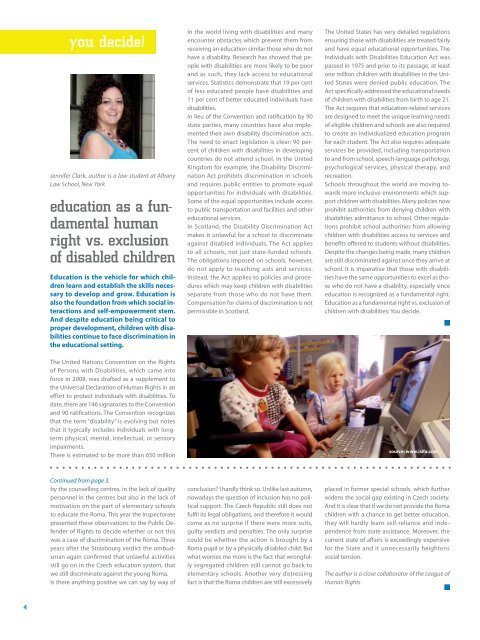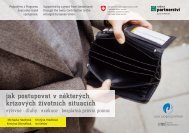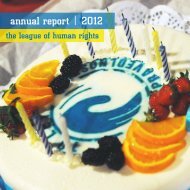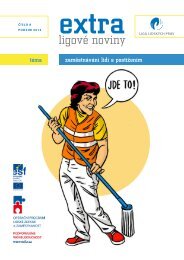EXTRA league papers | issue 3 | winter 2010 | What Schools Do We Want for our Children?
Create successful ePaper yourself
Turn your PDF publications into a flip-book with our unique Google optimized e-Paper software.
4<br />
you decide!<br />
Jennifer Clark, author is a law student at Albany<br />
Law School, New York<br />
education as a fundamental<br />
human<br />
right vs. exclusion<br />
of disabled children<br />
Education is the vehicle <strong>for</strong> which children<br />
learn and establish the skills necessary<br />
to develop and grow. Education is<br />
also the foundation from which social interactions<br />
and self-empowerment stem.<br />
And despite education being critical to<br />
proper development, children with disabilities<br />
continue to face discrimination in<br />
the educational setting.<br />
The United Nations Convention on the Rights<br />
of Persons with Disabilities, which came into<br />
<strong>for</strong>ce in 2008, was drafted as a supplement to<br />
the Universal Declaration of Human Rights in an<br />
eff ort to protect individuals with disabilities. To<br />
date, there are 146 signatories to the Convention<br />
and 90 ratifi cations. The Convention recognizes<br />
that the term “disability” is evolving but notes<br />
that it typically includes individuals with longterm<br />
physical, mental, intellectual, or sensory<br />
impairments.<br />
There is estimated to be more than 650 million<br />
Continued from page 3.<br />
by the counselling centres, in the lack of quality<br />
personnel in the centres but also in the lack of<br />
motivation on the part of elementary schools<br />
to educate the Roma. This year the Inspectorate<br />
presented these observations to the Public Defender<br />
of Rights to decide whether or not this<br />
was a case of discrimination of the Roma. Three<br />
years after the Strasb<strong>our</strong>g verdict the ombudsman<br />
again confi rmed that unlawful activities<br />
still go on in the Czech education system, that<br />
we still discriminate against the young Roma.<br />
Is there anything positive we can say by way of<br />
in the world living with disabilities and many<br />
encounter obstacles which prevent them from<br />
receiving an education similar those who do not<br />
have a disability. Research has showed that people<br />
with disabilities are more likely to be poor<br />
and as such, they lack access to educational<br />
services. Statistics demonstrate that 19 per cent<br />
of less educated people have disabilities and<br />
11 per cent of better educated individuals have<br />
disabilities.<br />
In lieu of the Convention and ratifi cation by 90<br />
state parties, many countries have also implemented<br />
their own disability discrimination acts.<br />
The need to enact legislation is clear: 90 percent<br />
of children with disabilities in developing<br />
countries do not attend school. In the United<br />
Kingdom <strong>for</strong> example, the Disability Discrimination<br />
Act prohibits discrimination in schools<br />
and requires public entities to promote equal<br />
opportunities <strong>for</strong> individuals with disabilities.<br />
Some of the equal opportunities include access<br />
to public transportation and facilities and other<br />
educational services.<br />
In Scotland, the Disability Discrimination Act<br />
makes it unlawful <strong>for</strong> a school to discriminate<br />
against disabled individuals. The Act applies<br />
to all schools, not just state-funded schools.<br />
The obligations imposed on schools, however,<br />
do not apply to teaching aids and services.<br />
Instead, the Act applies to policies and procedures<br />
which may keep children with disabilities<br />
separate from those who do not have them.<br />
Compensation <strong>for</strong> claims of discrimination is not<br />
permissible in Scotland.<br />
conclusion? I hardly think so. Unlike last autumn,<br />
nowadays the question of inclusion has no political<br />
support. The Czech Republic still does not<br />
fulfi l its legal obligations, and there<strong>for</strong>e it would<br />
come as no surprise if there were more suits,<br />
guilty verdicts and penalties. The only surprise<br />
could be whether the action is brought by a<br />
Roma pupil or by a physically disabled child. But<br />
what worries me more is the fact that wrongfully<br />
segregated children still cannot go back to<br />
elementary schools. Another very distressing<br />
fact is that the Roma children are still excessively<br />
The United States has very detailed regulations<br />
ensuring those with disabilities are treated fairly<br />
and have equal educational opportunities. The<br />
Individuals with Disabilities Education Act was<br />
passed in 1975 and prior to its passage, at least<br />
one million children with disabilities in the United<br />
States were denied public education. The<br />
Act specifi cally addressed the educational needs<br />
of children with disabilities from birth to age 21.<br />
The Act requires that education-related services<br />
are designed to meet the unique learning needs<br />
of eligible children and schools are also required<br />
to create an individualized education program<br />
<strong>for</strong> each student. The Act also requires adequate<br />
services be provided, including transportation<br />
to and from school, speech-language pathology,<br />
psychological services, physical therapy, and<br />
recreation.<br />
<strong>Schools</strong> throughout the world are moving towards<br />
more inclusive environments which support<br />
children with disabilities. Many policies now<br />
prohibit authorities from denying children with<br />
disabilities admittance to school. Other regulations<br />
prohibit school authorities from allowing<br />
children with disabilities access to services and<br />
benefi ts off ered to students without disabilities.<br />
Despite the changes being made, many children<br />
are still discriminated against once they arrive at<br />
school. It is imperative that those with disabilities<br />
have the same opportunities to excel as those<br />
who do not have a disability, especially since<br />
education is recognized as a fundamental right.<br />
Education as a fundamental right vs. exclusion of<br />
children with disabilities: You decide.<br />
s<strong>our</strong>ce: www.isifa.com<br />
placed in <strong>for</strong>mer special schools, which further<br />
widens the social gap existing in Czech society.<br />
And it is clear that if we do not provide the Roma<br />
children with a chance to get better education,<br />
they will hardly learn self-reliance and independence<br />
from state assistance. Moreover, the<br />
current state of aff airs is exceedingly expensive<br />
<strong>for</strong> the State and it unnecessarily heightens<br />
social tension.<br />
The author is a close collaborator of the League of<br />
Human Rights

















